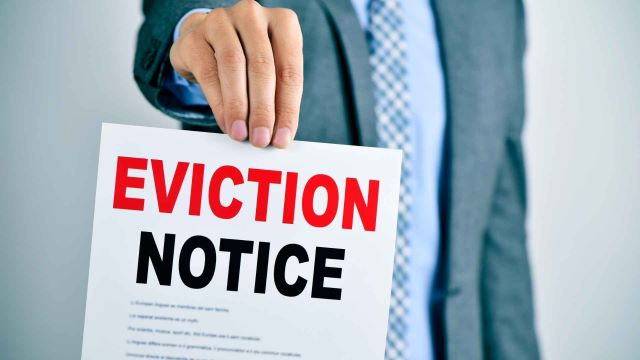Evictions can be complicated, and protecting the rental property and the landlord's rights requires an awareness of the legal procedures involved in the California eviction process.
Because lease termination is governed by specific legislation, the eviction procedure needs to be managed properly to prevent expensive legal issues or delays.
To ensure compliance with local and state laws, Fireside Property Management has created this guide to assist property managers and owners in navigating the California eviction process.
We will discuss the main legal grounds for ending a lease with cause, such as unlawful activities, nonpayment of rent, and lease violations.
Notice for Lease Termination with Legal Cause
In California, there are several legal grounds for a landlord to evict a tenant, including the following:
Not paying rent.
Violating the lease agreement.
Partaking in illegal activities on the property.
Not having a lease or rental agreement or having an expired lease while still living on the property.
It's crucial to make sure that any eviction process in California is carried out in compliance with local and state rules in California. Depending on the kind of eviction, the renter must receive different written notices. The following are the most common written notice types:

3-Day Notice to Pay Rent or Vacate: This notice is issued when a tenant has not paid rent as required. This eviction notice allows the tenant three days to either make the overdue payment or move out of the property.
3-Day Notice to Remedy or Vacate: Applicable for lease violations that can be resolved, such as the presence of an unauthorized pet or minor damages. The tenant has three days to correct the issue or leave the rental unit under the eviction process in California.
3-Day Unconditional Notice to Vacate: Reserved for serious lease breaches or illegal activities, such as criminal behavior on the property. In these cases, the tenant is required to leave immediately, with no option to correct the violation as a part of the eviction process in California.
30 or 60 Day Notice to Vacate: This applies when there is no active lease, or the lease has expired and the tenant remains on the property. A 30-day notice is given if the tenant has lived on the premises for less than one year, while a 60-day notice is required for tenants who have resided there for a year or more.
In California, the length of the tenancy and the particular conditions determine whether to serve an eviction notice to a tenant and start an eviction lawsuit.
In a fixed-term lease, unless there is a valid reason, like a breach of the conditions of the lease, the landlord cannot start the termination process until the conclusion of the lease period. Eviction proceedings need to wait until then.

Either way, the renter must be made fully aware in the notification that the lease will not be extended.
It's crucial to make sure that all notices adhere to local rules and California's rent control laws, as these may place extra conditions or limitations on ending a lease.
Tenant Eviction Defenses in California
Tenants can utilize a defense to contest the eviction and make the case as to why the landlord shouldn't win. Tenants in California are entitled to the following defenses when getting the court papers delivered:
Failure to Adhere to Legal Eviction Protocols: Landlords must strictly follow the steps outlined by California law during the eviction process. Skipping any part of the procedure can invalidate the eviction under the California courts.
Retaliatory Actions: Evictions cannot be carried out as retaliation for a tenant exercising their legal rights, such as reporting unsafe living conditions or filing a complaint against the landlord.
Uninhabitable Living Conditions: Tenants may contest an eviction if the landlord has failed to maintain the property in a habitable condition, such as neglecting essential repairs or failing to address health and safety hazards.
Full Rent Payments Made: If a tenant has paid the rent owed within the notice period provided, the eviction may not proceed under California law because unpaid rent is no longer an issue.
Discriminatory Practices: Evictions based on a tenant’s race, religion, gender, sexual orientation, disability, or membership in another protected class are illegal under federal and state fair housing laws.
Improper Termination of Lease Agreement: Landlords must provide appropriate notice and a valid reason to terminate a lease agreement. Failing to meet these requirements can result in the eviction being deemed unlawful. This can result in a default judgment in the tenant's favor.
Absence of a Valid Legal Reason: Evictions must be based on legally recognized causes, such as nonpayment of rent, violations of the lease, or illegal activities. Without a justifiable reason, the eviction lawsuit will not hold up in court and the security deposit must be returned in full.

Depending on the specifics of the eviction case and rental unit, each of these arguments may differ and must be backed up by evidence. To provide a strong defense, tenants must be aware of their legal rights and the relevant California legislation. Both the landlord and the tenant should be protected by things such as the Tenant Protection Act.
Attending Court Hearing
It is recommended that the landlord and renter attend the eviction court hearing in California. Tenants typically have a short window of time—often only a few days—to take action, such as appealing the decision or requesting a stay of the unlawful detainer suit, if they lose the case.
There is no legally required grace time for this action, therefore moving quickly is essential. The court's eviction order will take effect if the tenant doesn't settle the dispute through payment or settlement within this period.
Writ of Restitution
The writ of execution acts as the tenant's final notice to vacate the property, providing them with an opportunity to collect their belongings. Once the writ is issued, tenants have five days to leave the premises voluntarily. If they fail to do so within this period, the sheriff will return to enforce the eviction.
The court may authorize the Sheriff's Department or a designated court officer to carry out the eviction if a landlord wins. After the writ is issued, the sheriff's office will notify the landlord of available eviction dates, which may vary depending on the department's workload and case volume.

The Eviction
After the court issues a Writ of Restitution, the landlord can reclaim the property with the assistance of the sheriff or another court-appointed official. Once the property is repossessed under the eviction laws, it is essential for the landlord to promptly change the locks to secure the premises. In California, landlords are legally obligated to store the belongings left behind by evicted tenants.
They must provide the tenant with a reasonable opportunity—typically 18 days—to retrieve their possessions. If the tenant fails to collect their items within this timeframe, the landlord must notify them of the intention to dispose of the belongings and ensure that all legal procedures are properly followed.
Bottom Line
If you're feeling overwhelmed by the eviction procedure, Fireside Property Management can help. From tenant marketing and screening to evictions, we specialize in assisting property owners with every aspect of property management.
Get in touch with our staff right now to find out how we can help with your property management needs!
Disclaimer: Please note that the information provided in this blog is intended for general guidance and should not be considered as a replacement for professional legal advice. It is important to be aware that laws pertaining to property management may change, rendering this information outdated by the time you read it



